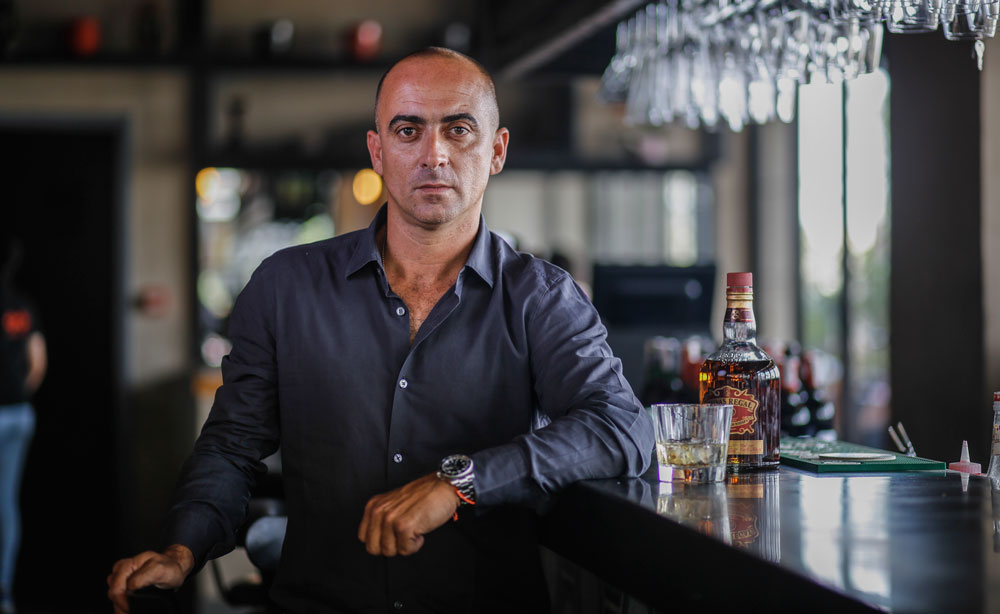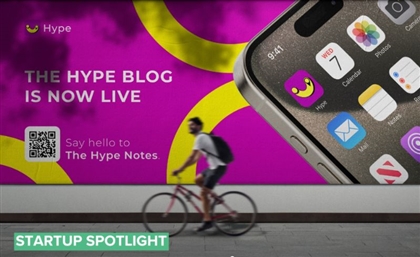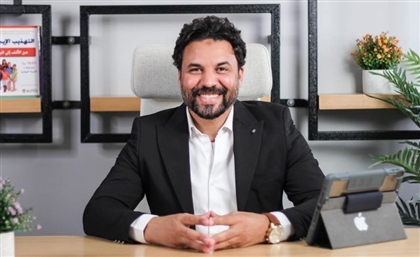Fabio Donato, The Hardcore Entrepreneur Turning the Tables on the Migration Conversation
The offspring of four generations of Italian workers, this iconic businessman, investor, and serial entrepreneur crystallises the untold success story of migrants. As he sips a glass of Chivas Regal Extra, he talks business ethics and traces the heritage of a hard-working family.

Fabio Donato is a 38-year-old hardcore entrepreneur; he runs two companies and is building the third one, he is an investor at Egyptian tech startup Elves, and the founding partner of six other enterprises across Egypt, Italy, Greece, and beyond. But, more importantly, he crystallises a successful story of migration that deeply resonates in today’s global landscape.
The offspring of four generations of Italians who crossed the Mediterranean in search of opportunities, Donato founded Arkan’s iconic eatery, Gigi Burger Bar, among several other enterprises. He enters the room with the confidence of an Italian dandy, and it doesn’t come as something of a shock – his grandfather, the son of an Italian migrant who arrived in the 1890s, was honoured as Commendatore dello Stato – an Italian equivalent of Britain’s Lords – for his ethics and hard work.
I haven’t managed to utter the first question and he’s already begun zealously elaborating his vision on business, entrepreneurship, and the reason he thinks businessmen are carrying the burden of the country. “Businessmen have a big responsibility, especially in Egypt, where large-scale entrepreneurs contribute to employment and manage the capable workforce of the country. The importance of the private sector in Egypt goes beyond anybody’s imagination because they are holding it together, even more than in Western countries,” he says. His burger restaurant, where we are sitting, revives the name of his grandfather Gigi, who was known as the King of F&B and ran the Golden Age of Cairo’s most iconic clubs, such as After Eight. As he pours a glass of Chivas Regal Extra on the rocks, we submerge into what seems to be his biggest priority: business ethics.

“There are a lot of wanna-be entrepreneurs that want to make money and go fast. But there is a process of building the personality of the entrepreneur, and then all of a sudden everything starts coming to you,” he says. “But I don’t prefer to work alone; I believe in partnerships because, if you want to grow fast, you need partners, which leads to business ethics. In order to be a good entrepreneur you don't need to just have a clean reputation; he needs to believe in ethics, which means transparency with partners and proving facts daily – whether it is numbers or deliverables. You cannot live in the business world if you don’t have business ethics.”
What do you think is the social responsibility of an entrepreneur?
You cannot lead businesses without setting an example. It’s like being in front of your kids. You cannot fake a personality, because people don’t learn what you tell them; they learn what they see. The same goes with the employee. If they see that you are working more than them, they will not ask for overtime; but if they see on Instagram that you are chilling on a boat while they are building your dream, this is not fair. That’s why I hardly take any vacations.
Tell me about your Italian roots.
My great-grandfather, who was from Sicily, arrived to Egypt as part of a massive migration; there were about 600,000 people looking for better prospects in Egypt. Both my grandparents married Maltese women and came to Egypt in the 1890s to work, just as people go to Dubai today. My great-grandfather had come to Egypt in search of a better place; there was a recession in Italy so they went to the Pearl of the Mediterranean. It was the most beautiful place back then. One of them was an engineer, the other one a farmer, and the other one a landscape artist.
After decades of hard work, his son - my grandfather- was recognised as Commendatore di Stato by the State of Italy, as my father was as well. But don’t let the title fool you; he was a very simple person. This title has nothing to do with money; it was an honourary title for ethics, not money. He is currently the head of the Italian Charity Association (Beneficenza Italiana), which also runs the Italian hospital in Abasseya.

Do you think Egypt hosted migrants better than some European nations are doing now?
Yes; it was the perfect society back then, especially when you think of Alexandria – a city that had a million people, of which 700,000 were Italian, Greek, and Armenian. You could hear all languages in the street. My grandfather doesn’t talk about his past that much. These were generations that went through two World Wars; my grandfather was taken by the German Nazis during a school trip – they saw things that we didn’t see. The world is getting harder in some things and easier in some others. We live in a world today where it is easier to do business. The generations that created what we are enjoying today lived more difficult times; they are usually like this because there are world events like a war, a world crisis, recession, that make you get up on your ass and work. That’s why I believe in the younger generations of Egyptians today. The situation makes the man - or the woman, or the person. And I believe that you are in total control of your destiny.
You are turning the tables on the whole conversation about migration.
Yes. It is a very common thing in this world we are living in today. You go to an Italian school, and you have the African-Italians, the Chinese-Italians; it’s like a little New York in Rome. People are getting to know each other and the world more, and technologies are allowing us to travel easily. It’s not really called migration anymore; I think the word will disappear – the world is one now.
What’s the imprint you want to leave in the world?
I want to leave an imprint on my sons. I would like that my boys one day only hear good things about me. Don’t care too much about what people say; as long as you know what’s right and wrong.
And your biggest dream?
(He stops; perhaps his only pause throughout the whole conversation.) I’m a very simple man. My dream is actually small. Your question actually reminds me of a little Greek story of a businessman who once encountered a fisherman sitting by his fishing rod. “How long do you fish?” he asked him. “Like an hour,” the fisherman replied. “You know, you can fish for a longer time, make more fish to sell, then buy a boat and start getting more and more fish, and then turn it into a business,” the businessman said. The fisherman, perplexed, looked at him. “And then?” he asked. “So one day you can sit and enjoy fishing," the businessman replied. “But I’m already doing it, I’m already enjoying it.” Some people think that businessmen don’t like life, but I’m a big lover of life, nature, and the simple things. My biggest dream is to relax one day with my wife after all the hard work.
The content of this article is sponsored.
Photography by @MO4Network's #MO4Productions.
Photographer: Ahmed Najeeb.
- Previous Article Bassita: Click Funding for a Better Egypt
- Next Article New App Lets You Book A 'Vespa' For Your Next Ride






















